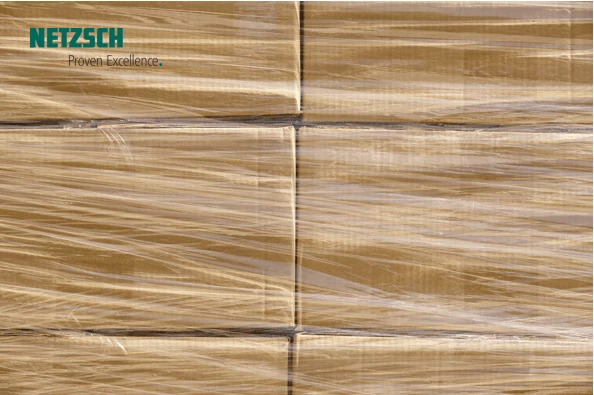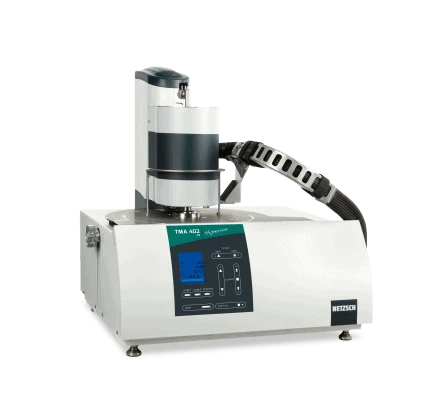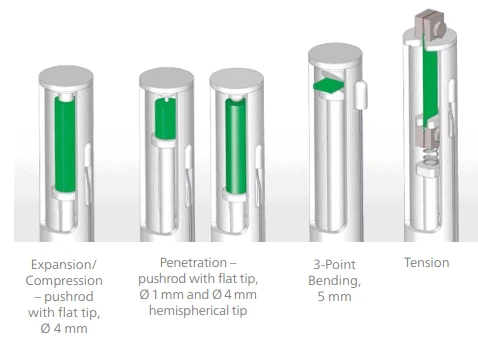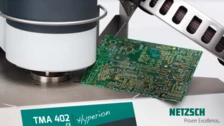
26.10.2020 by Gabriele Stock
Unique Tool for the Prediction of Product Performance and Processing Behavior under Thermal Expansion Control
The New TMA 402 F3 Hyperion®Polymer Edition

Modern products made of polymers are all around us. Polymers are used for everyday products but also for challenging applications. The tricky bit is to assure compatibility when different polymers are joined together. For blends or compounds, such as composite materials, the prediction of material behavior in practice is just as important as the functionality of the product. It is essential to understand how materials or assemblies will react to environmental influences like ContrainteLa Contrainte est définie par un niveau de force appliquée sur un échantillon d’une section bien définie. (Contrainte = force/surface). Les échantillons qui possèdent une section rectangulaire ou circulaire peuvent être comprimés ou étirés. Les matériaux élastiques comme les élastomères peuvent être étirés jusqu’à 5 à 10 fois leur longueur initiale.stress, temperature or different atmospheres. Especially when a product is used in harsh environments or under extreme temperatures, the coefficient of thermal expansion, determined by thermomechanical analysis (TMA), serves as important information in deciding whether a material is suitable for the selected application. For measurements of highly filled or highly cross-linked materials, such as composites, TMA is advantageous over the better-known Differential Scanning Calorimetry (DSC) because it is the more sensitive method for determining the Température de Transition VitreuseThe glass transition is one of the most important properties of amorphous and semi-crystalline materials, e.g., inorganic glasses, amorphous metals, polymers, pharmaceuticals and food ingredients, etc., and describes the temperature region where the mechanical properties of the materials change from hard and brittle to more soft, deformable or rubbery.glass transition temperature.
The New TMA 402 Polymer Edition – Tailored for Tests on Polymers
The new TMA 402 F3 Hyperion®Polymer Edition by NETZSCH is a thermomechanical analyzer tailored for material tests on polymers. It allows for precise determination of the coefficient of linear thermal expansion (Coefficient d'Expansion Thermique Linéaire (CLTE/CTE)The coefficient of linear thermal expansion (CLTE) describes the length change of a material as a function of the temperature.CTE) and the glass transition temperature ‒ important properties for assuring a product’s quality. Even the slightest of length changes – into the nanometer range – will be detected by the TMA’s highly sensitive LVDT system. Even with its high sensitivity, the system has a robust design that also accommodates quality control needs.

Convenience and Flexibility Second to None
The TMA 402 F3 Hyperion®Polymer Edition is equipped with a highly reactive furnace for the temperature range between -70°C and 450°C. A mechanical cooling system is connected for this temperature range, thus eliminating any further need for liquid nitrogen.
A broad selection of fused silica sample holders ensures flexibility and allows for various measurement modes and sample geometries:
- Expansion/compression mode for cylindrical or rectangular samples
- Penetration mode for determination of the softening point
- Tension mode for films and fibers
- 3-point bending mode
The operator can easily change out the instrument’s sample holder system in a matter of seconds.
Additionally, in expansion, penetration and tension mode the system will automatically detect the sample length, which saves time and ensures accurate data input.
For non-solid samples like powders and waxes, there are sample containers available.

Effortless Measurement of Thin Films and Fibers by Continuously Measuring the Applied Force
For measurements under load, the force operating on the sample is generated electromagnetically. A highly sensitive sensor continuously measures the force exerted via the pushrod and readjusts it automatically. This sets the TMA 402 F3 Hyperion®Polymer Edition apart from other instruments, which only use preset values. The control system allows users to set the force value in the mN-range, which enables testing even on sensitive materials such as thin fibers or films. When setting up measurements in tension mode, an alignment tool ensures convenient sample preparation for thin films and foils.
Comfortable Determination of Visco-Elastic Properties like Relaxation, Creep and Stress/Strain
When polymers are characterized, there is often the need to determine visco-elastic properties. In a RelaxationWhen a constant strain is applied to a rubber compound, the force necessary to maintain that strain is not constant but decreases with time; this behavior is known as stress relaxation. The process responsible for stress relaxation can be physical or chemical, and under normal conditions, both will occur at the same time. relaxation test, for example, the deformation of the sample is kept constant and the progression of the force is recorded. Material RelaxationWhen a constant strain is applied to a rubber compound, the force necessary to maintain that strain is not constant but decreases with time; this behavior is known as stress relaxation. The process responsible for stress relaxation can be physical or chemical, and under normal conditions, both will occur at the same time. relaxation makes the force decrease continuously. The stress-RelaxationWhen a constant strain is applied to a rubber compound, the force necessary to maintain that strain is not constant but decreases with time; this behavior is known as stress relaxation. The process responsible for stress relaxation can be physical or chemical, and under normal conditions, both will occur at the same time. relaxation strength is defined by the residual stress measured after a defined exposure period. The new TMA 402 F3 Hyperion® Polymer Edition is also capable of measuring displacement in isostrain mode. This mode helps gather information about the temperature at which a material starts to shrink, how much it shrinks and with how much force.
Sophisticated Software Only Available at NETZSCH
Another specialty that sets the TMA 402 F3 Hyperion® Polymer Edition apart from other instruments is the intelligent AutoEvaluation software feature offered exclusively by NETZSCH. It self-actuates to automatically evaluate thermoanalytical measurement curves without using pre-defined macros, which is an immense support and time saver.
The other powerful software feature of great value is the unique Identify database. Offering a means of verifying materials, it allows for comparison of a given curve to other individual curves, which can be very valuable in quality control tasks. It can also compare measurement data to literature data from selected libraries. Any library and class created by the user can be edited or expanded within Identify.
All this and more is available in the competitively priced TMA 402 F3 Hyperion®Polymer Edition. Find out more about the instrumenthere!
Or contact your local sales representative, who will be pleased to assist with your questions!


